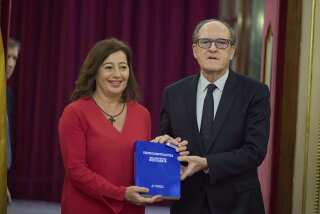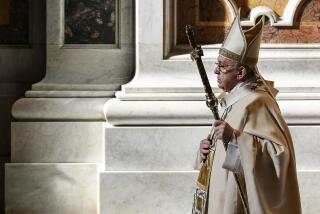Study Sought of Morocco’s Rights Record
- Share via
RABAT, Morocco — An Islamic organization Friday called for an independent inquiry into Morocco’s human rights record after authorities acknowledged that 56 people had died in secret detention centers since the 1970s.
On Thursday, a human rights group appointed by King Hassan II published for the first time the names of the detainees who died, including 30 military officers involved in coup attempts against the monarchy in 1971 and 1972.
The government has begun implementing last week’s royal decree to clear Morocco’s human rights record “once and for all” within six months.
The 30 officers were among 112 people reported missing by their families in social and political unrest since the 1960s.
“Under the instructions of His Majesty King Hassan, the Consultative Council for Human Rights [CCDH] made public . . . the files of certain detainees, of those so-called disappeared people and 56 persons who already died,” the official MAP news agency said.
According to the list of names published by the CCDH, 30 of them were officers who died in a secret detention center between 1973 and 1991.
The list was published three days after the authorities released 28 political prisoners but kept 20 others in jail for “acts of killings and sabotage.”
“The real figure of political prisoners is much more than 36. . . . Only God knows how many are there in the black file of human rights,” the London-based Islamic Observation Center’s International Commission on Human Rights said in a statement.
The organization gave the names of 36 Islamists still in Moroccan jails, which it said included an unspecified number of Algerians.
The commission called for international pressure to force Morocco to “declare the names of those responsible for human rights violations and bring them to a public trial.”
“A commission of inquiry composed of Moroccan and foreign groups should be set up to investigate the conditions of prisoners and Morocco detention centers,” it added.
Most of those freed Tuesday under the royal pardon were Muslim fundamentalists jailed after clashes with leftist students in the early 1990s, officials and activists said.
Earlier this week, CCDH chief Driss Dahak said his multi-party group will set up a panel to decide the fate of 12 students who had received jail terms that were as long as 20 years.
The royal amnesty did not include Morocco’s two most famous activists--Sheikh Abd Assalam Yasine, leader of the main Islamic group Justice and Welfare, and Abraham Serfaty, a Jewish Marxist-Leninist leader living in exile in France.
Yasine, 70, living under house arrest since 1989, was not included in a 1994 general royal amnesty. A court has recently upheld an Interior Ministry decision denying entry to Serfaty, expelled to France in 1991 after serving 17 years in jail.
More to Read
Sign up for Essential California
The most important California stories and recommendations in your inbox every morning.
You may occasionally receive promotional content from the Los Angeles Times.










